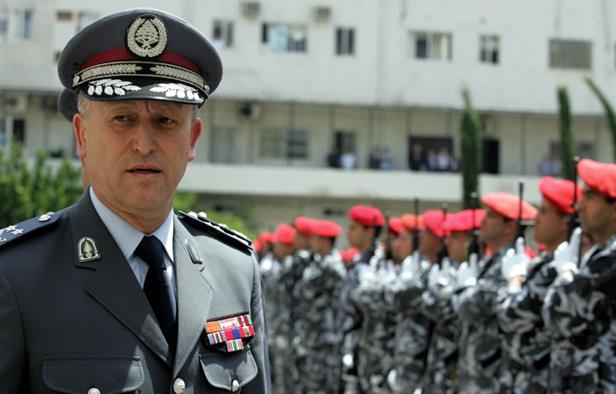The Rifi revolt
Alex Rowell/Nolw Lebanon/March 09/16
The hawkish Hezbollah foe has resigned from cabinet and chastised his March 14 allies. But can he achieve anything alone?
The fragile stability of Prime Minister Tammam Salam’s cabinet suffered its first casualty late last month with the surprise resignation of Justice Minister and former Internal Security Forces head, Maj. Gen. Ashraf Rifi. Declaring that, “The practices of Hezbollah’s statelet and its allies are not acceptable and staying in the government means approving them,” Rifi handed in his notice and returned to his house in the northern city of Tripoli, where a crowd of supporters gathered to chant in celebration.
In the days since, Rifi has sought to shake things up further, criticizing his ostensible allies in the Future Movement and calling in a 50-minute interview with Al-Jazeera for the fall of the entire cabinet, an end to dialogue between Future and Hezbollah, and even a “second Independence Intifada to eject the statelet of Hezbollah,” referring to the 2005 uprising that led to the Syrian army’s withdrawal from Lebanon.
With these characteristically hawkish stances against the Party of God and its patrons in Tehran and Damascus, the cabinet’s loss of Rifi may represent a blow for the Future-led March 14 coalition. Though a newcomer to government, in his former role as security czar Rifi boasted a track record of countering Syria’s and Hezbollah’s operations. Under his watch, the ISF investigator Wissam Eid would uncover evidence that later led the Special Tribunal for Lebanon to indict five Hezbollah members for the 2005 assassination of Prime Minister Rafiq al-Hariri. And it was Rifi’s deputy, ISF intelligence chief Brig. Gen. Wissam al-Hassan, who would catch the pro-Damascus politician Michel Samaha red-handed in the act of planning a series of bombings of Lebanese civilian targets in coordination with Syrian regime officials. Both Eid and Hassan were later assassinated, and Rifi has long been himself deemed a possible target.
In his final weeks in government, Rifi campaigned for the retrial of Samaha (sentenced to just four and a half years’ imprisonment) in a non-military court, a demand now officially dropped from the cabinet’s agenda.
He also vocally opposed the presidential candidacies of Hezbollah allies Michel Aoun and Suleiman Franjieh. In both of these battles he was publicly at odds with Future Movement leader Saad al-Hariri, who had personally endorsed Franjieh, and who tweeted in regard to the Samaha question that “Minister Rifi’s stance does not represent me.”Rifi’s resignation was thus a “protest” against “the weakness of the government,” according to Asaad Bishara, a journalist and advisor to Rifi (who could not be reached for comment himself). I
In his Al-Jazeera interview, Rifi described the cabinet as “a riding-camel” for Hezbollah, providing a veneer of legitimacy for the party’s military interventions in Syria and elsewhere.
Beyond the symbolism of this protest, however, it’s unclear what Rifi can now tangibly achieve. Asked what specifically the former minister would do to bring about a “second Independence Intifada,” Bishara could only reply in general terms about continuing “national and patriotic work […] as part of [former] Prime Minister Rafiq al-Hariri’s project.” While the timing of his resignation raised eyebrows – coming as it did just two days after Saudi Arabia canceled a $4bn aid package to Lebanon, partly in anger at the perceived underperformance of March 14 – Bishara categorically ruled out the possibility of Rifi seeking to work with Riyadh to try and form his own alternative to the Future Movement.
Indeed, for their part, Future sources characterized Rifi’s move as a blunder that hasn’t garnered the reaction he was hoping for. An aide to a current Future cabinet minister, requesting anonymity due to the sensitivity of the subject, spoke caustically to NOW of Rifi as a political naïf who let his newfound status get to his head, and who will fail to have any further impact unless he makes amends with Hariri. “Ashraf is the latest in a very long chain,” said the aide. “We’ve seen so many people [start] thinking of themselves as not only working for Saad, or being part of Saad’s team, but as allies of Hariri. Would Ashraf Rifi be a minister in the first place if Saad Hariri hadn’t decided it? On the contrary.”According to the aide, Rifi had discussed his plans to resign in advance with Future officials, saying he wanted to try going solo politically.
“[Hariri] sent him envoys, [Future MP] Ahmad Fatfat talked to him twice. And Ashraf was very sincere, by the way, in saying, ‘You know what, I think I have something to do. I think I have an experiment to go through, let me go through it, and we’ll see what happens.’ He wanted to test himself […] with the Hariri audience, with the people in Tripoli, with the Sunnis in general.”“But I think that, besides the Facebook and Twitter euphoria that he created for a few hours, and the couple of hundred ‘likes’ he earned, he didn’t really do much, in real politics.”In the end, then, if Rifi seeks a political future, he will likely rebuild bridges with Hariri sooner or later, those with whom NOW spoke said. “Of course, there are lots of people within Future who are not happy with the policy of Saad al-Hariri, and I think [Rifi] is expressing out loud their criticisms,” said former Tripoli MP Misbah al-Ahdab. “But we still did not hear any solutions, and this is why I think that we’re not very concerned by this disagreement, knowing very well that [Rifi and Hariri] will meet again and fix their personal problems.”
**Amin Nasr contributed reporting.























